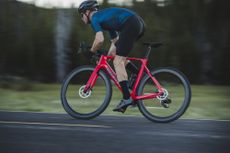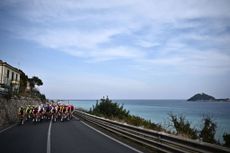Parcours Strade wheelset review
Light-footed wheels optimised for wider rubber
- (opens in new tab)
- (opens in new tab)
- (opens in new tab)
- Sign up to our newsletter Newsletter
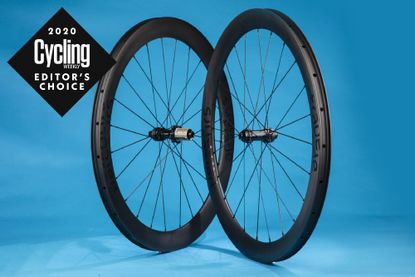
There really is a plethora of wheel brands out there, and it can be hard for consumers to differentiate the good from the bad. But take it from us: Parcours spent a solid 12 months partnering with engineering experts to develop the Strade, and it's not bluffing with the science. The result is a capable wheel, which is as strong and sturdy as it is light footed, with attention to detail evident in the build spec. All for under £1000. The weight is just a fraction higher than what's offered by the competition, but it's not really enough for a rider to notice.
-
+
Aero tested for 28mm
-
+
Stable
-
+
Nimble
-
+
Value for money
- +
-
-
Marginally heavier than competition
Why you can trust Cycling Weekly Our expert reviewers spend hours testing and comparing products and services so you can choose the best for you. Find out more about how we test.

The Parcours Strade wheelset was selected for an Editor's Choice award (opens in new tab) in 2020. This year's list contains 78 items which scored a 9 or 10/10 with our tech team - this gear is the best of the best, and has received the Cycling Weekly stamp of approval.
An aerodynamic wheel is only as fast as its rider's ability to control it allows: a wind cheatingly deep rim will be no good if the result is an increase in distance covered due to wavering on the straights or squaring off the corners.
With this in mind, when British brand Parcours created its new Strade mid-section wheelset (opens in new tab), it prioritised stability in crosswinds as well as a rim optimised for 28mm tubeless tyres.
All about stability
Working with the Sports Engineering department at Nottingham Trent University, the team sent testers out with Calypso marine ultrasonic anemometers fitted to their front and rear wheels. Over the course of several months, as well as many strange looks directed at the spaceship contractions, they collected data which showed the average battering each was getting.
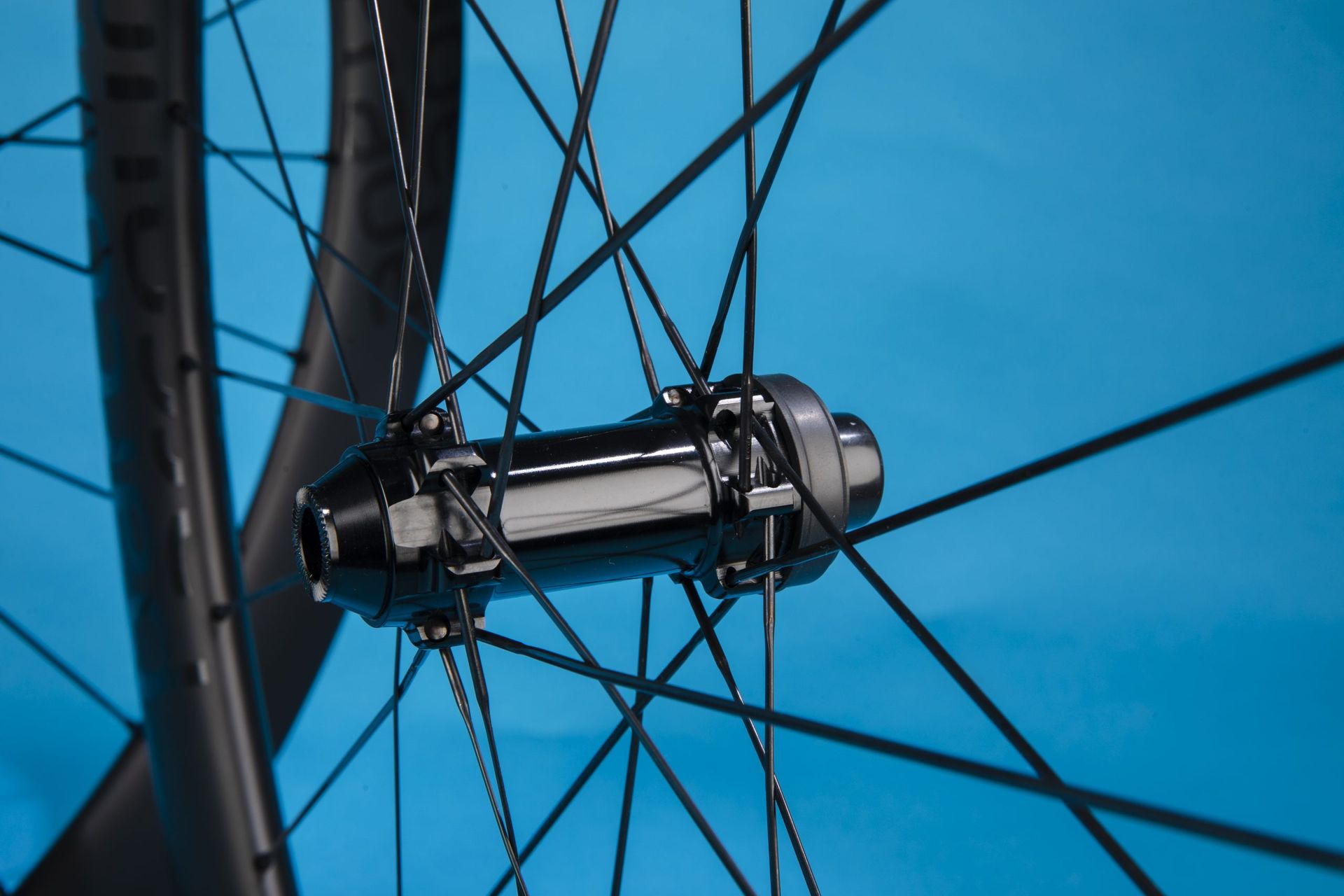
The results confirmed suspicions: the front wheel was consistently experiencing a higher yaw angle, with the rear seeing a lower yaw angle, on average, due to the impact of the bike and rider.
To cater for this, the engineers decided to take a mismatched approach, designing differential rims in line with the conditions. Parcours used a blunt 49mm U-shaped rim with a 32mm external width at the front, and a sharper 54mm V-shaped rim with a width of 30.5mm at the back.
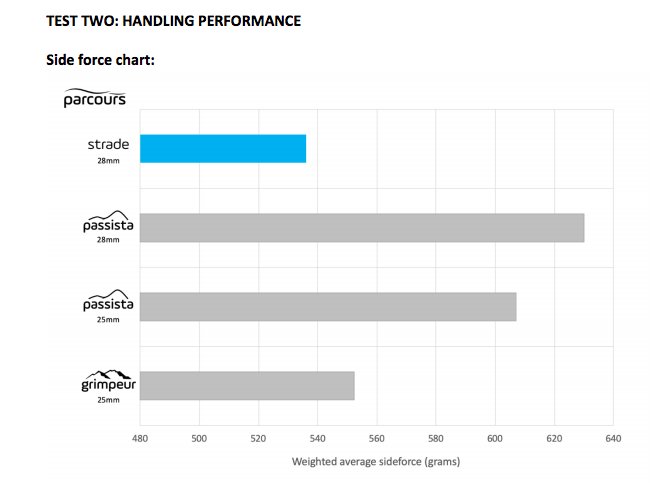
Further testing provided the seal of approval - when Parcours tested the Strade against its 40mm Grimpeur wheel, the new design experienced around a third less side force impact.
Ready for wide tyres
The original remit, of course, was to design a rim that would allow riders to run 28mm tyres without sacrificing aero gains.
Why? A wider tyre provides greater contact with the ground, offering security in the corners. They can be run at lower pressure (particularly with the growing trend towards tubeless tyres) boosting comfort - hence why we're seeing more and more 28mm rubber specced on endurance bikes where riders seek compliance and stability.
For racers, in some conditions 28mm rubber may also be faster, the lower pressure allowing the tyre to absorb imperfections as opposed to wasting energy skitting over them. However, on most standard wheels, a 28mm tyre blows up to protrude from the edge of the rim and can be held responsible for greater drag.
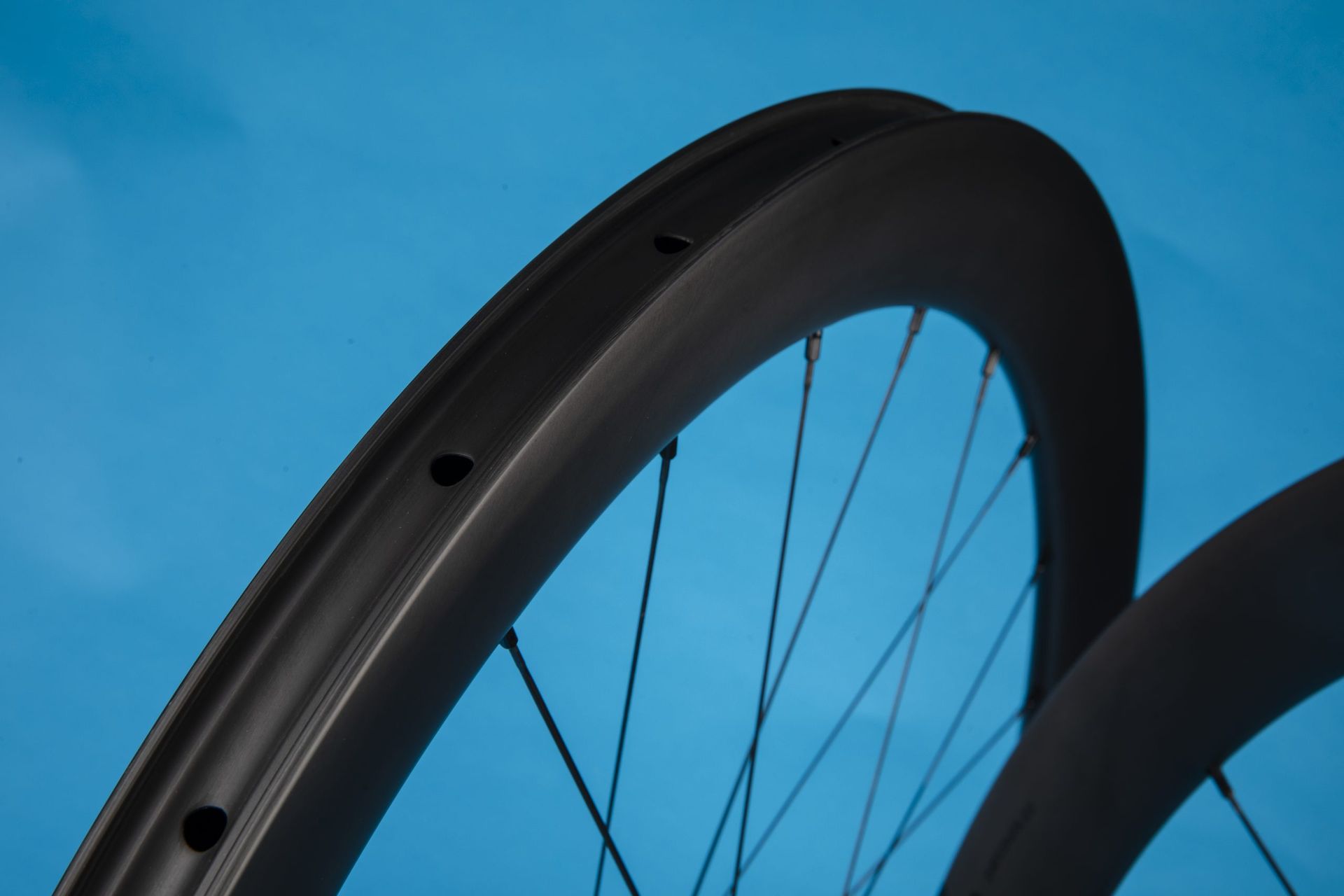
To smooth out the wider tyre and dissipate the aero penalty, Pacours developed wider rims. The brand opted for an internal measurement of 22.5mm - and external measurements of 32mm and 30.55 front and rear respectively.
Following iterative CFD analysis, it took two different pairs to the A2 Wind Tunnel in North Carolina - where one version proved faster than its previous Passista mid-section wheel, both wearing 25 and 28mm tyres, the latter being the quickest.
When compared with a baseline wheelset - shallow alloy wheels Fulcrum 5s - the new Strade fitted with a 28mm GP5000 TL tyre (at 80psi) was 58 seconds faster over 40 kilometres, with a rider travelling at 50kph. Using a 25mm tyre on the Strade the saving was 56s - more than the Passista with a 25mm tyre (54s) and a lot more than the Passista with 28mm rubber (37s).
Arguably, the numbers mainly show that Parcours made a faster wheel all round when compared with its existing Passista option - but the gap between the Passista with 25s vs 28s is clearly much greater, demonstrating success in the tailored approach.
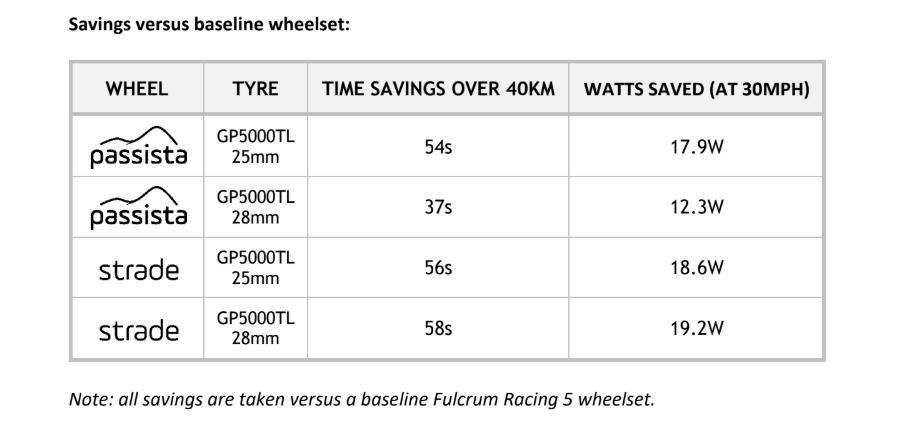
Parcours did not test its wheel against competitors of similar depths, citing concerns over mixing protocol and making unfair conclusions.
The brand tested the wheels alone, not attached to a bike and without a dummy or rider. That means we know the data is unsullied by external factors, but we also can't guarantee the same effect in the wild. Asked why they made this decision, Parcours points out that it would probably have to sell a lot of wheels to justify the days/weeks in the wind tunnel it would take to test the wheel with every bike model out there.
The spec sheet
It's not all about rim profile - a fast wheel is no use if the hubs have seized after a few months of riding and the spokes aren't easy to replace.
The Strade hoops come with own brand, precision machined alloy four pawl hubs, fitted with high-grade EZO cartridge bearings.
Parcours has used Sapim CX-Ray aero spokes, with 24 in a two-cross pattern at the front and rear. The hubs are designed for 12mm thru-axles front and rear - though adapter kits are available, and they use a Centrelock disc fitment.
A set weighs in a 1520g (690g front, 830g rear) - and at £999 these stats place them within the competitive arena, give or take 50g. By comparison, Cero's RC50 disc wheels (RRP £1000) come in at 1471g, whilst the Hunt 50 aero disc set will set you back £849 and drop into the scales with a claimed weight of 1487g.
The ride
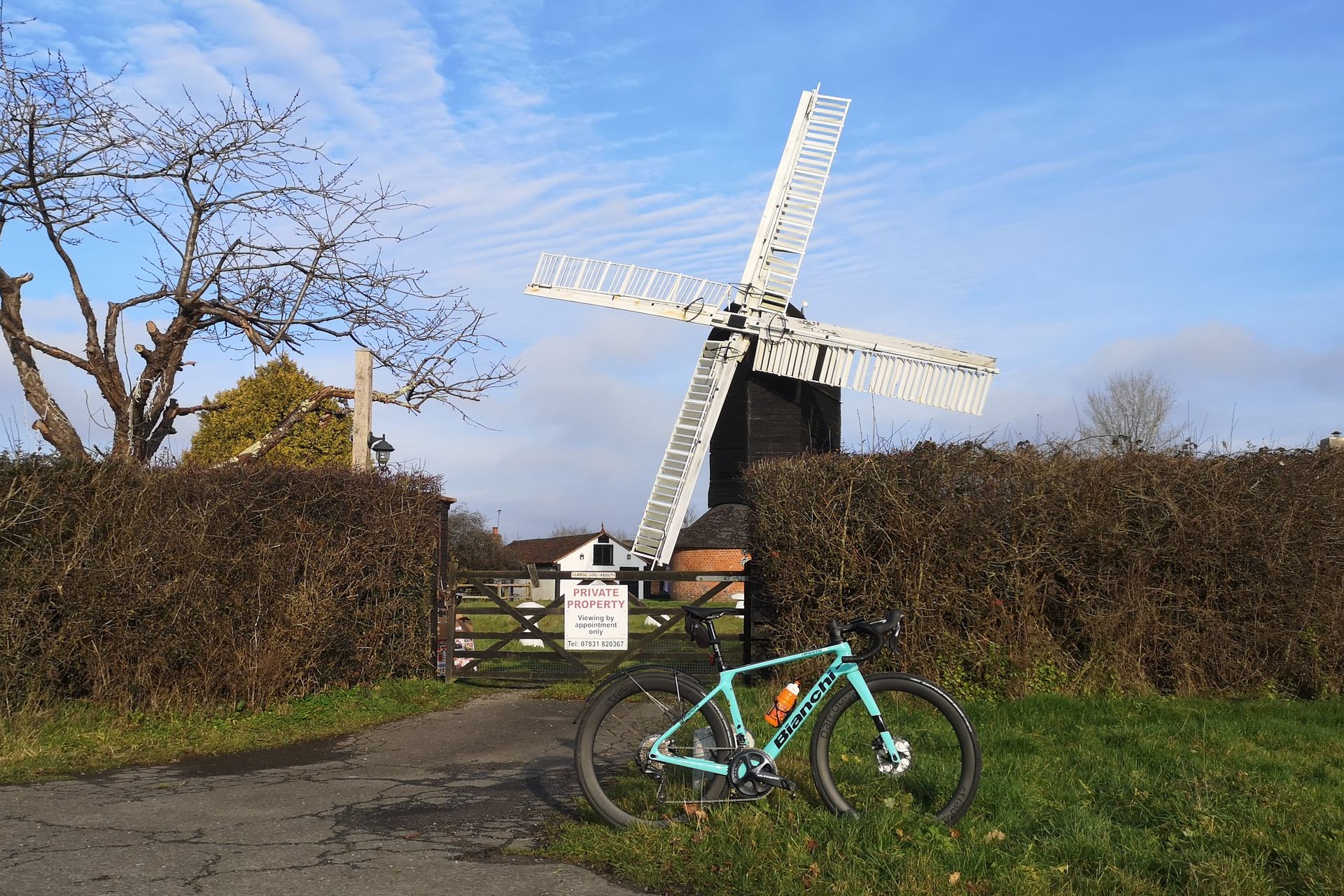
It's near impossible to discern the 21s saving afforded by the Strade, when compared with the likes of Parcours' outgoing Passista. Having tested these wheels over winter, I think it's fair to say I've not ridden 40km at 30mph, as per the wind tunnel tests.
The claimed aero credentials with a 28mm tyre are a nice to have, but the reality for most of us is that unless you've optimised every single element of your set up, it's unlikely you'll notice the difference. The human body makes up 80-90 per cent of drag on a bike, so the biggest gains are to be found in positioning. For me, the pièce de résistance of this wheelset has to be the crosswind capabilities.
Despite blustery days, I've really not found myself pulled to the side at vulnerable points - for example when crossing gates or over bridges. I did get whipped sideways a little by a passing lorry, that was a big ask for a 50mm set of wheels. Even at the Thruxton Motor Circuit which, like all such airfield perimeter tracks, is renowned for its ability to trap even mild wind and turn it into a cyclone - these hoops held firm.
It's not just the Strade's ability to combat crosswinds which is impressive. I have taken them over hill and dale, down fast flat lanes, sploshing through grimy lanes, I've even managed to get them tangled with the front wheel of a rider who might have accidentally overlapped a wheel on a club run.
The ride quality came through from the very first outing, and resilience has been proven so far. An expertly laced carbon layup means these wheels feel exceptionally sprightly for a mid section rim, they were never a bore on the climbs and the handling on fast winding bends has been excellent throughout.

Thank you for reading 10 articles this month* Join now for unlimited access
Enjoy your first month for just £1 / $1 / €1
*Read 5 free articles per month without a subscription

Join now for unlimited access
Try first month for just £1 / $1 / €1
Michelle Arthurs-Brennan is a traditional journalist by trade, having begun her career working for a local newspaper, where highlights included interviewing a very irate Freddie Star (and an even more irate theatre owner), as well as 'the one about the stolen chickens'.
Previous to joining the Cycling Weekly team, Michelle was Editor at Total Women's Cycling. She joined CW as an 'SEO Analyst', but couldn't keep her nose out of journalism and in the spreadsheets, eventually taking on the role of Tech Editor before her latest appointment as Digital Editor.
Michelle is a road racer who also enjoys track riding and the occasional time trial, though dabbles in off-road riding too (either on a mountain bike, or a 'gravel bike'). She is passionate about supporting grassroots women's racing and founded the women's road race team 1904rt.
Michelle is on maternity leave from July 8 2022, until April 2023.
-
 Outdoor clothing brand Jack Wolfskin doubles down on bikepacking apparel and luggage
Outdoor clothing brand Jack Wolfskin doubles down on bikepacking apparel and luggageThe outdoor brand rolls into the adventure cycling market with a more refined collection
By Hannah Bussey • Published
-
 High-end bikes still in demand says Giant, as it announces 12.5% revenue increase
High-end bikes still in demand says Giant, as it announces 12.5% revenue increaseBut like much of the industry the Taiwanese manufacturer is also experiencing a surplus of low to mid priced stock
By James Shrubsall • Published
-
 Milan-San Remo 2023: Route and start list
Milan-San Remo 2023: Route and start listAll you need to know about the first Monument of the 2023 season
By Ryan Dabbs • Published

